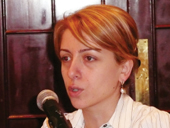Russia says it sent warplanes over South Ossetia to ‘prevent bloodshed’
By Mikheil Svanidze
Friday, July 11 [Updated July 13]

The Georgian Defense Ministry claimed on Wednesday to have radar evidence of four Russian fighter planes crossing into Georgian airspace the night before.
Moscow says they had reason to believe Georgia was ready to mount an operation in South Ossetia to free four soldiers held by the separatist authorities.
“For clarification of situation, Russian Air Force planes made a short flight over the territory of [secessionist South Ossetia]. As further development of the situation showed, this step let hot heads in Tbilisi cool down and prevent the development of the situation by a forceful scenario, the possibility of which was very high,” read a statement from the Russian Foreign Affairs Ministry.
Georgian peacekeeper commander Mamuka Kurashvili leveled “threats and insults” against the de facto South Ossetian capital while speaking on the phone with the Russian commander of the peacekeeping forces in the region, the Russian statement asserted.
“There was a necessity to act instantaneously and decisively, to prevent bloodshed and keep the situation in the lawful, peaceful framework.”
Moscow’s acknowledgement of what amounts to a military violation of Georgia’s legal borders is an extraordinary and tension-raising admission which analysts say is meant to assert Russian dominance in regional security.
The statement, released late yesterday afternoon as United States Secretary of State Condoleezza Rice wrapped up her brief visit to Tbilisi, drew a prompt and angered response from Georgian officials.
“An unprecedented thing has happened—for the first time, the aggressor country openly stated that they conducted an act of aggression,” said Foreign Minister Eka Tkeshelashvili at an 8 p.m. briefing televised live.
Davit Bakradze, the speaker of parliament, said: “[Moscow] assumed that their impudence and impunity reached such limit, that there is no more need of investigation, no need for international reaction. They themselves can officially confirm the fact that their military aircraft violate Georgian borders.”
South Ossetian separatist leader Eduard Kokoity called the Russian flyover a “timely” decision justified by Russia's responsibility to protect its citizens.
“I just want to say that on the territory of the South Ossetian republic, 95 percent of the population are citizens of the Russian Federation,” Kokoity told Russian reporters in Moscow, where he met separately with the Abkhaz separatist leader met and the Russian foreign minister.
Tbilisi called home its ambassador to Russia for “consultations.”
“Russia has done just about all that it can do here without going so far as to recognize the separatists' independence,” says Ana Jelenkovic, an analyst who covers Georgia for Eurasia Group in New York.
Russia’s confirmation of the flyovers is not an especially severe step, she said, given that Russian planes are known to have flown over Georgian territory many times in the past, albeit typically accompanied by denials from Moscow.
“The fact that they are admitting to it today falls in line with what's been happening recently. Russia is dominating this geopolitical relationship. Georgia has US support, but in the end, Russia is in the power role. The fact that Russia made the admission on the same day that Rice discussed how the international community will become more involved is also a signal to [the US and Europe] that Russia is still very much in charge of the security situation.”
Georgian analysts read an ominous message into the flights.
“[The Russian statement] is not just irony, but also a threat that next time ‘cold showers’ may be used to cool ‘hot heads,’” said military analyst Koba Liklikadze.
It is the first time Moscow has admitted its aircraft flew into Georgian airspace since 1999, according to Liklikadze, when Moscow blamed pilot error for a bombing near the Georgian mountain village of Shatili.
Georgia last recalled its ambassador to Russia on November 7, when authorities accused Russian security services of having a hidden hand behind anti-government demonstrations which culminated in a crisis that day.
